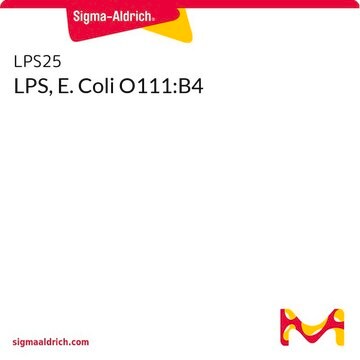L4516
Lipopolysaccharides from Escherichia coli O127:B8
BioXtra, suitable for cell culture, γ-irradiated
Synonym(s):
LPS
About This Item
Recommended Products
biological source
Escherichia coli (O127:B8)
Quality Level
sterility
γ-irradiated
product line
BioXtra
form
lyophilized powder
purified by
gel-filtration chromatography
technique(s)
cell culture | mammalian: suitable
impurities
<1% Protein (Lowry)
solubility
H2O: 5 mg/mL, slightly hazy
storage temp.
2-8°C
Looking for similar products? Visit Product Comparison Guide
Application
- to study the LPS-induced macrophage survival in mice
- to elicit the secretion of cytokines by cattle PBMC
- to study apoptosis of highly susceptible macrophage cells in a LPS-induced proinflammatory environment
- to perform autophagy assay in BV2 and BV2-LC3 cells
- for stimulation of human monocytes, macrophages and mouse microglia cells
- to induce pentraxin-3 expression in 293T cells
Biochem/physiol Actions
Reconstitution
Other Notes
related product
Signal Word
Danger
Hazard Statements
Precautionary Statements
Hazard Classifications
Acute Tox. 2 Oral
Storage Class Code
6.1A - Combustible acute toxic Cat. 1 and 2 / very toxic hazardous materials
WGK
WGK 3
Flash Point(F)
Not applicable
Flash Point(C)
Not applicable
Certificates of Analysis (COA)
Search for Certificates of Analysis (COA) by entering the products Lot/Batch Number. Lot and Batch Numbers can be found on a product’s label following the words ‘Lot’ or ‘Batch’.
Already Own This Product?
Find documentation for the products that you have recently purchased in the Document Library.
Customers Also Viewed
Articles
Explore the structure, function, and diverse applications of Lipopolysaccharides. Discover their role in bacteria, serological specificity, and research potential.
Explore the structure, function, and diverse applications of Lipopolysaccharides. Discover their role in bacteria, serological specificity, and research potential.
Explore the structure, function, and diverse applications of Lipopolysaccharides. Discover their role in bacteria, serological specificity, and research potential.
Explore the structure, function, and diverse applications of Lipopolysaccharides. Discover their role in bacteria, serological specificity, and research potential.
Our team of scientists has experience in all areas of research including Life Science, Material Science, Chemical Synthesis, Chromatography, Analytical and many others.
Contact Technical Service


